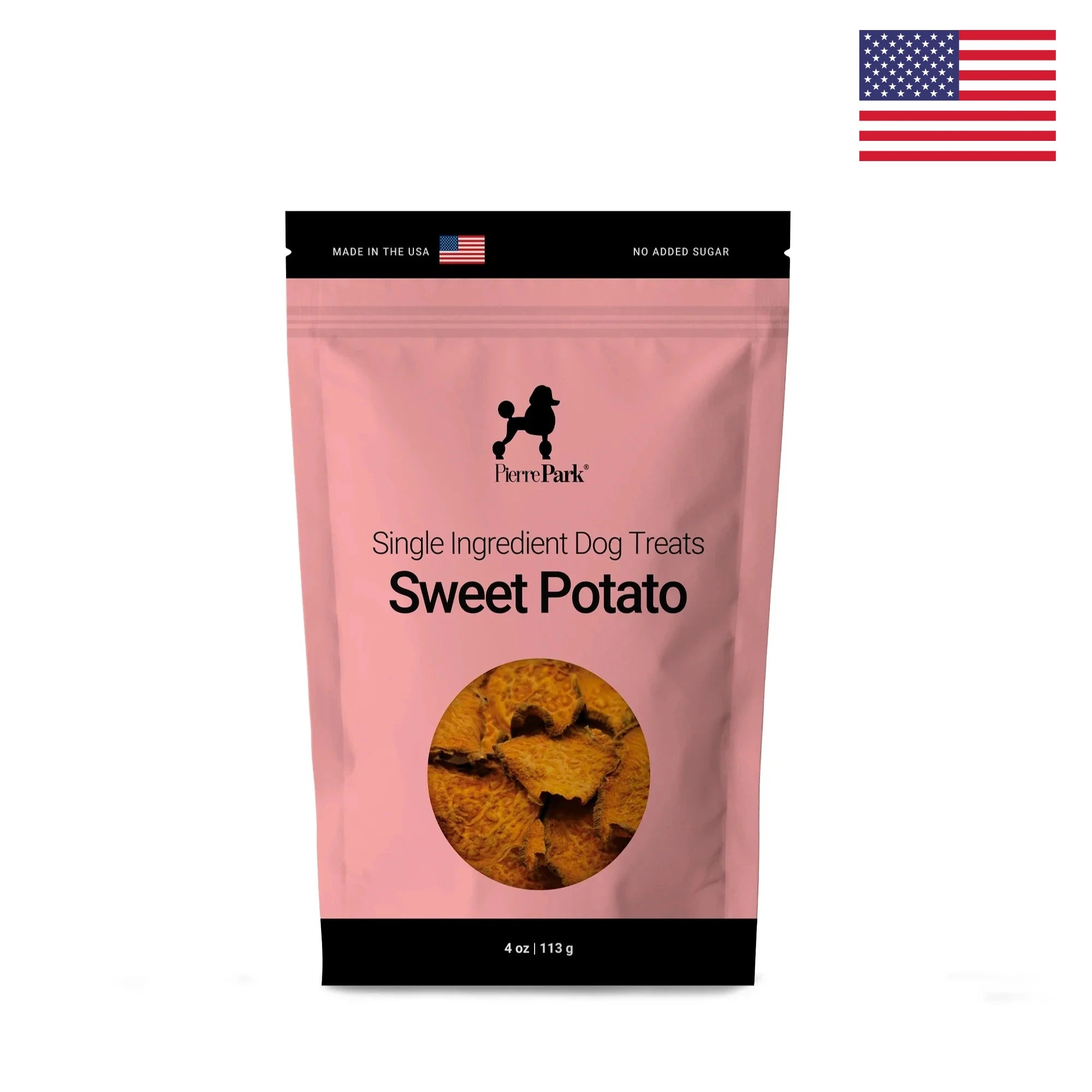Table of Contents
- Understanding Canine Kidney Disease
- Sweet Potatoes: Nutritional Profile
- Sweet Potatoes and Kidney Disease: The Pros and Cons
- Veterinary Perspectives on Sweet Potatoes and Kidney Disease
- Alternatives to Sweet Potatoes for Dogs with Kidney Disease
- Preparing Sweet Potatoes for Dogs with Kidney Disease
- Monitoring Your Dog's Health
- Conclusion: Making Informed Decisions for Your Dog's Health
Vet-Approved

This article has been rigorously reviewed and validated by Dr. Annina Müller, med. vet., an accomplished veterinarian who earned her veterinary degree at the University of Bern, specializing in Small Animal Surgery. Her expertise ensures that the advice provided is both current and accurate in the field of veterinary medicine.
As a dog owner, it's crucial to understand how kidney disease can affect your pet's diet. This comprehensive guide explores the relationship between sweet potatoes and dogs with kidney issues, helping you make informed decisions about your dog's nutrition and overall health.
Understanding Canine Kidney Disease
What is kidney disease in dogs?
Kidney disease in dogs is a serious condition that affects the ability of the kidneys to filter waste products from the blood. According to research published in the Journal of Veterinary Internal Medicine, early detection and dietary management are crucial factors in managing canine kidney disease progression. This chronic condition can lead to a buildup of toxins in the body, impacting overall health and quality of life. As kidney function declines, dogs may experience symptoms such as increased thirst, frequent urination, and loss of appetite. Chronic kidney disease is progressive and requires careful management to support your dog's health and well-being.
Renal failure, another term for advanced kidney disease, occurs when the kidneys can no longer effectively perform their vital functions. This can result in a range of health issues, including electrolyte imbalances, anemia, and high blood pressure. Early detection and proper management of kidney disease are essential for maintaining your dog's quality of life and slowing the progression of the condition.
How does kidney disease affect a dog's diet?
How does kidney disease affect a dog's diet? Proper nutrition plays a crucial role in managing kidney disease in dogs, requiring careful dietary modifications to support kidney function. According to Dr. Klein, Chief Veterinary Officer for the AKC, diet changes are one of the main treatments for chronic kidney disease (CKD), along with fluid administration. A specialized diet for dogs with kidney disease focuses on helping the kidneys function more efficiently while ensuring the dog receives proper nutrition.
Veterinarians can prescribe specifically formulated diets designed for dogs with kidney issues, as regular commercial dog food may not meet their unique nutritional needs. The balancing and correction of electrolytes are extremely important in managing kidney patients, requiring careful monitoring and adjustment of dietary components. Since each dog's condition and needs may vary, it's essential to work closely with a veterinarian to determine the most appropriate diet for your pet. The dietary plan may need to be adjusted over time as the disease progresses to ensure optimal kidney support and overall health maintenance.
What are the dietary restrictions for dogs with kidney disease?
Dogs with kidney disease often require specific dietary restrictions to manage their condition effectively. One of the primary concerns is limiting phosphorus intake, as high phosphorus levels can further strain the kidneys. A low-phosphorus diet is typically recommended, which may involve avoiding certain foods and treats that are naturally high in this mineral. Additionally, protein intake is often moderated in dogs with kidney issues to reduce the workload on the kidneys while still meeting essential nutritional needs.
Other dietary considerations for dogs with kidney disease include managing sodium intake to help control blood pressure and ensuring adequate hydration. Some veterinarians may recommend a low-protein diet, especially in advanced stages of kidney failure. It's important to note that dietary restrictions can vary based on the individual dog's condition and the stage of kidney disease. Homemade dog food recipes or specialized commercial renal diets may be recommended to meet these specific nutritional requirements while supporting kidney health.
Sweet Potatoes: Nutritional Profile
What nutrients are found in sweet potatoes?
Sweet potatoes are nutrient-dense vegetables that offer a variety of beneficial compounds for dogs. They are rich in complex carbohydrates, providing a good source of energy. Sweet potatoes also contain significant amounts of dietary fiber, which can support digestive health. Additionally, they are packed with vitamins, particularly vitamin A in the form of beta-carotene, which is important for eye health, immune function, and skin condition. Other nutrients include vitamin C, vitamin B6, and potassium.
For dog owners looking for convenient ways to add the benefits of sweet potatoes to their pet’s diet, sweet potato treats can be an easy and healthy choice. These treats retain their natural nutrients while remaining free of additives, making them a healthy snack option for your dog.
How do these nutrients typically benefit healthy dogs?
For healthy dogs, the nutrients found in sweet potatoes can offer various benefits. The complex carbohydrates provide a steady source of energy, while the dietary fiber supports digestive health and can help regulate bowel movements. The high vitamin A content in sweet potatoes is particularly beneficial for maintaining healthy vision, supporting the immune system, and promoting skin and coat health. The antioxidants present in sweet potatoes may help combat oxidative stress and support overall cellular health.
Sweet potatoes can be a nutritious addition to a balanced dog food diet for healthy dogs. They are often used as an ingredient in commercial dog foods and can be a good alternative to grains for dogs with sensitivities. Some dog owners use sweet potatoes as a healthy dog treat or incorporate them into homemade dog food recipes. However, it's important to note that while sweet potatoes can be beneficial for healthy dogs, their appropriateness for dogs with kidney disease requires careful consideration due to their nutrient composition, particularly their phosphorus content.
Are sweet potatoes considered a low-phosphorus food?
Sweet potatoes are generally not considered a low-phosphorus food, which is an important consideration for dogs with kidney disease. While they contain less phosphorus than some other starchy vegetables, their phosphorus content is still significant enough to warrant caution in dogs with kidney issues. The phosphorus levels in sweet potatoes can vary depending on factors such as soil conditions and preparation methods, but they typically fall into the moderate range for phosphorus content.
For dogs with kidney disease, managing phosphorus intake is crucial for maintaining kidney health and slowing the progression of the condition. While sweet potatoes may not be classified as a low-phosphorus food, they can still be included in some dogs' diets in moderation, depending on the individual dog's condition and dietary needs. It's essential to consult with a veterinarian to determine if sweet potatoes can be safely incorporated into a renal diet and in what quantities. Balancing the nutritional benefits of sweet potatoes with their phosphorus content is key when considering them as part of a diet for dogs with kidney issues.
Sweet Potatoes and Kidney Disease: The Pros and Cons
What are the potential benefits of sweet potatoes for dogs with kidney disease?
Sweet potatoes may offer some potential benefits for dogs with kidney disease when used judiciously. Their high fiber content can help regulate digestion and promote a feeling of fullness, which can be beneficial for dogs on restricted diets. The complex carbohydrates in sweet potatoes provide a source of energy that may be easier for dogs with kidney issues to metabolize compared to high-protein foods. Additionally, the vitamins and antioxidants in sweet potatoes could support overall health and potentially help mitigate some of the secondary effects of kidney disease.
For dogs with kidney disease that are on a low-protein diet, sweet potatoes can serve as a valuable source of calories and nutrients without adding significant protein load. The potassium content in sweet potatoes may also be beneficial for some dogs with kidney disease, as potassium levels can sometimes be low in these patients. However, it's crucial to note that the appropriateness of sweet potatoes in a dog's renal diet depends on the individual dog's condition, stage of kidney disease, and overall nutritional needs. Any potential benefits must be weighed against the risks, particularly concerning phosphorus intake.

What are the risks of feeding sweet potatoes to dogs with kidney disease?
The primary risk of feeding sweet potatoes to dogs with kidney disease is related to their phosphorus content. Dogs with kidney issues often need to limit phosphorus intake to manage their condition effectively. While sweet potatoes are not exceptionally high in phosphorus compared to some foods, their phosphorus levels may still be too high for dogs with advanced kidney disease or those on strict low-phosphorus diets. Excessive phosphorus intake can contribute to the progression of kidney disease and may exacerbate associated health problems.
Another consideration is the carbohydrate content of sweet potatoes. While this can be beneficial in providing energy, it's important to balance carbohydrate intake with other nutritional needs. Overconsumption of sweet potatoes could lead to weight gain or blood sugar fluctuations in some dogs. Additionally, raw sweet potatoes can be difficult for dogs to digest and may cause gastrointestinal upset. It's crucial for dog owners to work closely with a veterinarian to determine if sweet potatoes are appropriate for their dog with kidney disease and, if so, in what form and quantity they should be given.
How does the phosphorus content in sweet potatoes impact dogs with kidney issues?
The phosphorus content in sweet potatoes is a critical factor to consider for dogs with kidney issues. In dogs with compromised kidney function, the ability to excrete excess phosphorus is reduced, which can lead to elevated phosphorus levels in the blood. High phosphorus levels can contribute to the progression of kidney disease and may lead to secondary health problems, such as weakening of the bones. For this reason, managing phosphorus intake is a key component of dietary management for dogs with kidney disease.
While sweet potatoes are not among the highest phosphorus foods, their phosphorus content may still be significant enough to impact dogs with kidney issues, especially those in advanced stages of kidney disease. The impact of sweet potatoes on a dog's phosphorus levels can vary depending on the amount fed, the frequency of feeding, and the individual dog's kidney function. Some dogs with early-stage kidney disease may be able to tolerate small amounts of sweet potato in their diet, while others with more advanced kidney failure may need to avoid them entirely. Regular monitoring of blood phosphorus levels and close consultation with a veterinarian are essential when considering incorporating sweet potatoes into the diet of a dog with kidney disease.
Veterinary Perspectives on Sweet Potatoes and Kidney Disease
What do veterinarians say about feeding sweet potatoes to dogs with kidney disease?
Veterinary perspectives on feeding sweet potatoes to dogs with kidney disease can vary based on individual cases and the latest research. Many veterinarians approach the issue with caution, acknowledging both the potential benefits and risks. Some veterinarians may recommend small amounts of sweet potatoes as part of a balanced renal diet, particularly for dogs in early stages of kidney disease or those struggling with appetite. They often emphasize the importance of moderation and careful monitoring when incorporating sweet potatoes into the diet of dogs with kidney issues.
However, other veterinarians may advise against feeding sweet potatoes to dogs with kidney disease, especially those with advanced renal failure or significantly elevated phosphorus levels. These professionals often prioritize strict phosphorus restriction and may recommend alternative low-phosphorus vegetables like butternut squash, green beans and cucumbers, or specially formulated renal diets. The consensus among most veterinarians is that any decision to include sweet potatoes in the diet of a dog with kidney disease should be made on a case-by-case basis, considering factors such as the stage of kidney disease, overall health status, and individual nutritional needs. Regular check-ups and blood work are typically recommended to monitor the impact of dietary changes on kidney function and overall health.
Are there any studies on sweet potato consumption in dogs with kidney problems?
Research specifically focused on sweet potato consumption in dogs with kidney problems is limited. Most studies related to canine kidney disease diet management tend to focus on broader nutritional strategies rather than individual foods. However, there is ongoing research into the role of various nutrients, including phosphorus and antioxidants, in managing kidney disease in dogs. These studies can provide insights that may be relevant to the consideration of sweet potatoes in renal diets.
While direct studies on sweet potatoes and canine kidney disease may be scarce, research on human kidney patients and dietary management can sometimes offer valuable perspectives that veterinarians consider when making recommendations for dogs. It's important to note that the lack of specific studies doesn't necessarily mean sweet potatoes are unsafe for all dogs with kidney disease; rather, it underscores the need for individualized dietary plans based on each dog's unique health status and nutritional requirements. Veterinarians often rely on a combination of available research, clinical experience, and ongoing monitoring to guide dietary recommendations for dogs with kidney issues.
Alternatives to Sweet Potatoes for Dogs with Kidney Disease
What are some kidney-friendly vegetables for dogs?
For dogs with kidney disease, there are several kidney-friendly vegetables that can be considered as alternatives to sweet potatoes. Green beans are often recommended as they are low in phosphorus and provide fiber and vitamins. Carrots are another good option, offering beta-carotene and fiber while being relatively low in phosphorus. Squash varieties like pumpkin or butternut squash can provide similar nutritional benefits to sweet potatoes but with lower phosphorus content. Cabbage and bell peppers are also generally considered safe for dogs with kidney issues when fed in moderation.
Other kidney-friendly vegetables may include cucumber, which is low in calories and phosphorus, and zucchini, which offers vitamins and minerals without significant phosphorus content. It's important to note that even these kidney-friendly vegetables should be introduced gradually and in appropriate portions. The specific vegetables and quantities recommended can vary based on the individual dog's condition and dietary needs. Always consult with a veterinarian before making significant changes to a dog's diet, especially for those with kidney disease. Proper preparation, such as steaming or boiling without added salt or seasonings, is crucial to ensure these vegetables are easily digestible and safe for dogs with kidney issues.
How can you provide similar nutrients without using sweet potatoes?
Providing similar nutrients to those found in sweet potatoes without actually using them involves carefully selecting alternative foods that offer comparable benefits while being more suitable for dogs with kidney disease. For the carbohydrate and fiber content, vegetables like pumpkin or butternut squash can be good substitutes, offering a similar texture and digestibility. These options are generally lower in phosphorus than sweet potatoes. To replace the vitamin A content, carrots are an excellent alternative, rich in beta-carotene and typically well-tolerated by dogs with kidney issues.
For the potassium content found in sweet potatoes, low-phosphorus fruits like apples or blueberries can be considered in small quantities. The antioxidants present in sweet potatoes can be sourced from other dog-safe fruits and vegetables, such as cranberries or bell peppers, which are often lower in phosphorus. It's crucial to remember that any dietary changes for dogs with kidney disease should be made under veterinary guidance. A balanced, specially formulated renal diet may be the best way to ensure all nutritional needs are met while managing phosphorus intake. Some commercial kidney-friendly dog foods or veterinary-approved homemade diet recipes can provide a balanced array of nutrients suitable for dogs with kidney issues without relying on sweet potatoes.
Preparing Sweet Potatoes for Dogs with Kidney Disease
If approved by a vet, how should sweet potatoes be prepared?
If a veterinarian approves the inclusion of sweet potatoes in a dog's kidney disease diet, proper preparation is crucial. The most recommended method is to cook the sweet potatoes thoroughly. Boiling or steaming are preferred methods as they help reduce the phosphorus content slightly compared to raw or baked sweet potatoes. It's important to avoid adding any seasonings, salt, or oils during the cooking process, as these can be harmful to dogs with kidney issues. After cooking, the sweet potatoes should be mashed or pureed to make them easier to digest.
Peeling the sweet potatoes before cooking is generally advised, as the skin can be harder to digest and may contain higher concentrations of certain nutrients. It's also crucial to allow the cooked sweet potatoes to cool completely before serving to prevent any risk of burns. Some veterinarians might recommend soaking sliced sweet potatoes in water for a few hours before cooking to potentially leach out some of the phosphorus, although the effectiveness of this method can vary. Always follow your veterinarian's specific instructions regarding preparation, as they may have recommendations tailored to your dog's individual health needs and the stage of kidney disease.
What serving size is appropriate for dogs with kidney issues?
Determining the appropriate serving size of sweet potatoes for dogs with kidney issues is crucial and should be done under veterinary guidance. The serving size can vary significantly based on factors such as the dog's size, the stage of kidney disease, overall health status, and the rest of the diet composition. Generally, if sweet potatoes are approved, they would be given in small amounts as part of a balanced meal plan. A common starting point might be a tablespoon or two for small dogs, and up to a quarter cup for larger breeds, but this can vary widely.
It's important to remember that sweet potatoes should not make up a large portion of the diet for dogs with kidney disease. They should be considered as a supplement to a specially formulated renal diet or as an occasional treat, rather than a staple food. The serving size may need to be adjusted based on how the dog responds and any changes in blood work or overall health. Regular monitoring and check-ups with a veterinarian are essential to ensure the serving size remains appropriate and doesn't negatively impact the dog's kidney function or phosphorus levels. As kidney disease progresses, the acceptable serving size may decrease or sweet potatoes may need to be eliminated from the diet entirely.
How often can sweet potatoes be given to dogs with kidney disease?
The frequency of feeding sweet potatoes to dogs with kidney disease should be carefully determined by a veterinarian based on the individual dog's condition. In most cases, if sweet potatoes are approved for a dog with kidney issues, they would typically be given sparingly and not as a daily food item. Some veterinarians might recommend offering sweet potatoes once or twice a week as part of a varied, kidney-friendly diet. However, for dogs with more advanced kidney disease or those requiring stricter phosphorus restriction, the frequency might be even less, perhaps only as an occasional treat.
It's crucial to integrate sweet potatoes into the overall dietary plan without exceeding the recommended daily intake of phosphorus and other nutrients. The frequency may need to be adjusted based on regular blood work and health assessments. Some dogs may tolerate sweet potatoes better than others, so close monitoring for any adverse reactions or changes in kidney function is essential. As kidney disease is progressive, the frequency of feeding sweet potatoes may need to be reduced over time. Always follow your veterinarian's guidance and be prepared to adjust or eliminate sweet potatoes from your dog's diet if recommended based on their evolving health status.
Monitoring Your Dog's Health
What signs should you watch for when introducing new foods?
When introducing new foods to a dog with kidney disease, including sweet potatoes, it's crucial to be vigilant for any signs of adverse reactions or changes in health status. Key signs to watch for include changes in appetite, either increased or decreased, which could indicate how well the dog is tolerating the new food. Gastrointestinal symptoms such as vomiting, diarrhea, or constipation should be closely monitored, as these can be indicators of digestive upset or intolerance to the new food. Any changes in urination patterns, including increased frequency or changes in urine color or odor, are particularly important to note in dogs with kidney issues.
Other signs to be aware of include changes in energy levels, either lethargy or unusual hyperactivity, which could suggest the new food is affecting the dog's overall well-being. Skin reactions, such as itching or redness, might indicate an allergic response to the new food. For dogs with kidney disease, it's also important to watch for signs of progression in their condition, such as increased thirst, weight loss, or changes in coat quality. Any noticeable swelling, especially around the face or limbs, could be a sign of fluid retention related to kidney function. If any of these signs are observed after introducing a new food, it's important to discontinue the food and consult with a veterinarian promptly. Regular weigh-ins and overall health assessments can also help track the impact of dietary changes on your dog's condition.
How often should dogs with kidney disease have check-ups?
Dogs with kidney disease typically require more frequent veterinary check-ups compared to healthy dogs. According to guidelines from the International Renal Interest Society (IRIS), regular monitoring and veterinary check-ups are essential for managing chronic kidney disease in dogs, with frequency varying based on disease stage. The frequency of these check-ups can vary depending on the stage of kidney disease and the individual dog's overall health status. In general, dogs with early-stage kidney disease might need check-ups every 3 to 6 months, while those with more advanced kidney failure may require monthly or even bi-weekly visits. These regular check-ups are crucial for monitoring the progression of the disease and adjusting treatment plans accordingly.
During these check-ups, veterinarians typically perform blood tests to assess kidney function, measure electrolyte levels, and check for anemia, which is common in dogs with kidney disease. Urinalysis is also frequently conducted to evaluate urine concentration and check for proteins or other abnormalities. Blood pressure measurements are often included, as hypertension is a common complication of kidney disease. The veterinarian may also perform physical examinations to assess overall health, check for signs of dehydration, and evaluate body condition. These regular assessments allow for timely adjustments to medication, diet, and overall management strategies. It's important for dog owners to maintain open communication with their veterinarian and report any changes or concerns between scheduled check-ups, as kidney disease can sometimes progress rapidly and require prompt intervention.
Conclusion: Making Informed Decisions for Your Dog's Health
Why is consulting with a veterinarian crucial for dogs with kidney disease?
Consulting with a veterinarian is absolutely crucial for dogs with kidney disease due to the complex and progressive nature of the condition. Kidney disease requires careful management and individualized treatment plans that can only be developed with professional veterinary expertise. Veterinarians have the knowledge and tools to accurately assess the stage of kidney disease, monitor its progression, and make informed decisions about diet, medication, and overall care. They can interpret blood work and urinalysis results to fine-tune treatment strategies and adjust dietary recommendations as the disease evolves.
Furthermore, veterinarians can provide guidance on potential complications of kidney disease and help manage secondary health issues that may arise. They play a vital role in educating dog owners about the condition, explaining the importance of dietary management, and offering practical advice on day-to-day care. Regular consultations allow for timely interventions and adjustments to the treatment plan, which can significantly impact the quality of life and longevity of dogs with kidney disease. Ultimately, the expertise of a veterinarian is invaluable in navigating the challenges of kidney disease and ensuring the best possible outcomes for affected dogs.






